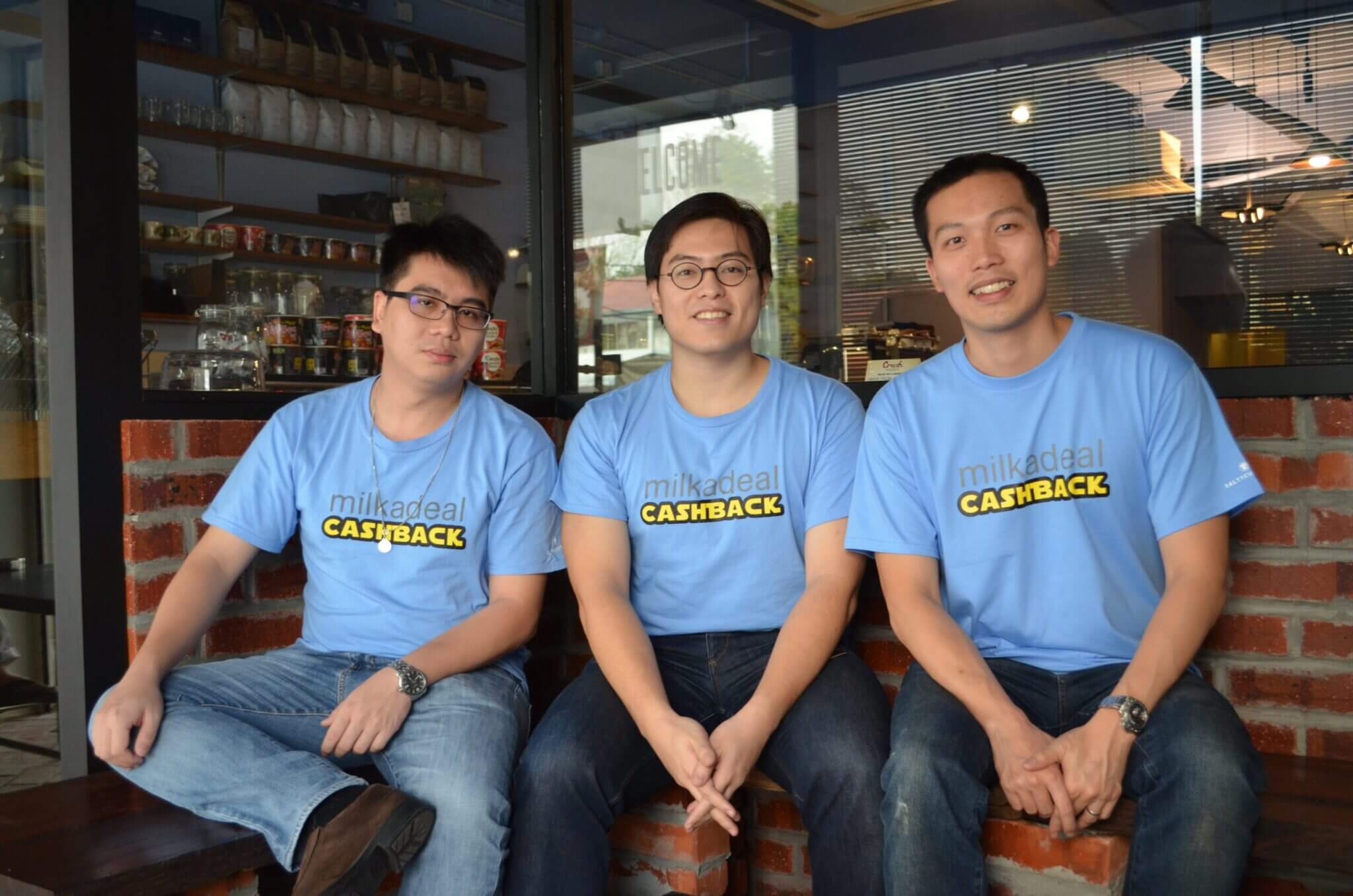Wilson Quah graduated from Warwick University with a Masters in Mathematics, Operational Research, Statistics and Economics (MMORSE) and started his career as an Investment Analyst at an investment bank in London. Wilson is passionate about improving the inefficiencies of the world. One should expect no less from an Operational Research expert!
On the other hand, Shaun Lee graduated from the London Shool of Economics & Political Science (LSE) and went on to train as a Chartered Accountant with Ernst & Young London. Shaun subsequently left his corporate job in 2009 and hasn’t looked back since. Shaun enjoys the thrill of bring in business, creating value and solving one problem at a time, and hopefully making a profit whilst at it.
Alex Yap is the Technical Founder for MilkADeal. He joined MilkADeal back in 2012 when MilkADeal was still operating as a daily deals site. He joined the company not only to manage but completely revamp the old system as it was not fast enough and was having a hard time keeping up with the growing demand in both functionality and feasibility. Alex played a major role in MilkADeal’s recent pivot to a Cashback site, as he spearheaded the technological and technical aspects of the company. Alex developed the Cashback system from scratch and has been introducing tonnes of new features and updates to the system since its first debut in May 2015. Alex holds a bachelor’s degree in Information System Engineering Universiti Tunku Abdul Rahman (UTAR).
In addition, Wilson and Shaun previously co-founded and exited an online wine business in 2010.
In your own words what is MilkADeal?
MilkADeal is an online Cashback portal. We reward consumers by providing them Cashback on their online purchases.
Existing partner stores include Agoda, Booking.com, Lazada, Expedia, AirAsiaGo, Zalora, Luxola, Reebonz, Taobao.com, Groupon, Qoo10, AliExpress, FoodPanda and many more. Cashback rates vary from RM50 per booking to 10% of your purchase value.
To get Cashback, all you have to do is go to MilkADeal.com and sign-in. Look for the store that you want to buy from, then click on the Shop Now button. You will be redirected to the store’s website where you will need to sign-in and make your purchase as you normally would.
Your Cashback will appear in your MilkADeal account by the next working day. You can then request to cash out once it’s confirmed and our accounts team will do an online bank transfer to you.
In case you were wondering where the Cashback comes from, we basically get a fee for every sale that we refer to our partner stores. We just share it with our users as Cashback!
How did you come up with the idea of MilkADeal?
MilkADeal started off as a daily deals site back in 2011. Our mission was to grow e-commerce by helping businesses get more sales and deliver genuine value to consumers. We transformed MilkADeal into a Cashback portal in May 2015 as soon as we acknowledged that we weren’t offering enough value to our customers. We had a smaller variety of products when compared to e-commerce giants like Lazada and Groupon.
The new Cashback portal on the other hand offers online businesses a performance based marketing channel unlike Facebook and Google advertising that doesn’t guarantee returns, whilst consumers are rewarded for shopping online. Ultimately, we still remain true to our mission of helping grow e-commerce in this region.
Could you walk us through the process of starting up MilkADeal?
We reached out to established Cashback players from around the world mainly in the US, UK and Europe and to our surprise most were very willing and open to share their experiences over Skype and Google Chat. From our learnings from those conversations, we were able to design our portal to cater to the needs of our partner stores as well as our customers.
As we have a technical founder, we wasted no time and just started building the portal from scratch. It took us about 6 weeks to launch the Cashback portal.
Did you encounter any particular difficulties during startup?
As this was a very new concept in Asia, we needed a functional product fast to prove that it would work in our local market. Therefore, we went into rapid-prototyping mode and moved and a very fast pace, whilst we kept our focus to build a fully functional prototype. When we launched in May 2015, our site was still in beta stages as we let our users test both the system and the concept out. We were fortunate that everything went smoothly and we soon went past beta stages to a now stable version within weeks. Our next difficulty lies in educating our users about Cashback to help gain their confidence when they use our portal.
How have you been developing MilkADeal since startup?
Identify a need or a problem. Build. Test. Improve or scrap. As we adopt this methodology, improvements are regular and in bite sizes.
What kind of feedback did you get for MilkADeal so far?
We have been getting some extremely happy customers since our transformation. Monthly transaction numbers and repeat rates are all on the rise. However, we must admit that we do get complaints about transactions that are not tracked properly, resulting in missing user cashback.
Our partner stores use a system which tracks exactly where the sale comes from, therefore unless we are able to demonstrate that the sale originated from MilkADeal, they will not give us Cashback. This means the user MUST start every shopping trip from MilkADeal and ensure they don’t have multiple tabs open before starting their shopping trip.
Unfortunately, this is the system that our partner stores use at the moment and we are not in a position to challenge them on this at the moment.
Do you face a lot of competition in this industry?
Yes, we do have some stiff competition in this industry with a few foreign players setting up shop on our shores. Our strategy is leverage off technology to achieve more efficiency with our limited resources.
What can you tell us about the industry?
We have learnt that Cashback users are highly loyal. Our direct traffic has increased between 4 – 5 folds since we transformed our website. Aside from that, our web conversion rate has also increased 5 – 6 folds since our launch.
It’s still very early days for the Cashback business, and whilst the current focus is on educating users about how the system works, the future probably lies in Online-To-Offline (O2O) transactions.
How do you plan to stay relevant in this industry?
The future of the industry will probably lie somewhere between the online and offline world. We are currently mainly promoting online stores, but we believe there is a huge opportunity in driving customers to offline businesses.
Were there anything that disappointed you initially?
To be honest, we thought hard about this question but haven’t been able to come up with anything that we were particularly disappointed in. Because every time we hit a road block or encounter a problem, rather than sulk about it, we immediately get our heads together and try to solve the problem. I guess we never really got to that stage where we tried and failed because we just keep trying!
What do you think about being an entrepreneur in Asia?
It’s definitely easier because of the lower cost of doing business and familiarity factor. Asia aside from China, is still at its infancy for online businesses, hence presents many more opportunities. The online leaders of today are not guaranteed the leadership position of tomorrow as anything can change from now until then.
Wilson and I previously founded an online wine store in Malaysia, where the distribution of alcohol is strictly controlled in a regulated environment. Such businesses could be harder due to the regulatory authorities which could change overnight in a change of government for example.
What is your opinion on Asian entrepreneurship vs Western entrepreneurship?
Asian entrepreneurship tends to gravitate towards making money, whilst Western entrepreneurship gravitates towards looking for solutions to the world’s biggest problems like cancer and whether there are other intelligent life forms in the universe. Western entrepreneurs are probably also more likely to seek for a solution to their problems regardless of the cost. Asian entrepreneurs on the other hand tend to want to retain control over their companies and have this high on the agenda, though this is slowly changing amongst the younger entrepreneurs. This is of course not supported by any empirical studies but is merely from observation.
The motivations behind an entrepreneur could largely be influenced by the environment in which the entrepreneur is accustomed to too. In developed countries, where social security is a norm, one could argue that entrepreneurs have less to lose. When compared to say a developing Asian country like Indonesia, an entrepreneur is probably more inclined to worry about where the next meal is going to come from, let alone world hunger.
We as humans probably exhibit child-like, creative and fearless behaviours when we know we are in a safe environment, and retreat in our shell in self-preservation mode when we are fearful of failure. Which could explain why lots if not most of new and ground-breaking technologies currently still come from the West.
Extreme fear could also push people to be more innovative too but in absolute terms, I believe this makes up the minority.
What is your definition of success?
That it’s neither final, nor certain.
Why did you decide to become an entrepreneur?
Because we believe that we have the ability to solve problems, create genuine value and make a difference in the lives of others. And it would be hard to achieve this sense of purpose if we were confined by walls that were built by others.
In your opinion, what are the keys to entrepreneurial success?
Ingredients:
Grit & Perseverance – for when things get a little sour.
Teamwork – for when it gets lonely.
Creativity – for when you need a breakthrough.
An open mind – as you need to be at school, everyday.
Strong professional network – make frenemies because you never know when they may buy you out.
Passion – for when you need to get out of bed in the mornings.
Focus and Discipline – to get the job done.
A pinch of luck – as you never know what opportunities may come.
Any parting words of wisdom for entrepreneurs out there from your personal experience?
We shall part with some very wise words of wisdom from a 12-year old Singaporean boy, Dylan Soh:
“If you don’t try, you won’t know. If you don’t know, the fear will grow.
So you must try, then you’ll know. And when you know, the fear will go.”
Connect
Website: milkadeal.com
LinkedIn:
https://my.linkedin.com/in/shaunism





























